-
 Bitcoin
Bitcoin $85,764.8527
1.24% -
 Ethereum
Ethereum $1,640.5294
0.24% -
 Tether USDt
Tether USDt $1.0000
0.02% -
 XRP
XRP $2.1500
0.59% -
 BNB
BNB $588.7662
-0.32% -
 Solana
Solana $131.5367
-1.14% -
 USDC
USDC $1.0000
0.02% -
 TRON
TRON $0.2514
-1.99% -
 Dogecoin
Dogecoin $0.1600
-2.46% -
 Cardano
Cardano $0.6448
0.06% -
 UNUS SED LEO
UNUS SED LEO $9.4288
0.43% -
 Chainlink
Chainlink $12.6840
-0.85% -
 Avalanche
Avalanche $19.9707
-1.42% -
 Stellar
Stellar $0.2409
-1.40% -
 Toncoin
Toncoin $2.9683
4.86% -
 Sui
Sui $2.2028
-3.53% -
 Shiba Inu
Shiba Inu $0.0...01196
-1.71% -
 Hedera
Hedera $0.1665
-0.67% -
 Bitcoin Cash
Bitcoin Cash $334.5521
-1.50% -
 Litecoin
Litecoin $78.0450
0.05% -
 Polkadot
Polkadot $3.6939
0.58% -
 Hyperliquid
Hyperliquid $16.3730
2.95% -
 Dai
Dai $1.0000
0.00% -
 Bitget Token
Bitget Token $4.3455
1.79% -
 Pi
Pi $0.7432
-1.89% -
 Ethena USDe
Ethena USDe $0.9991
0.01% -
 Monero
Monero $212.4327
1.86% -
 Uniswap
Uniswap $5.3960
-0.99% -
 OKB
OKB $52.1734
-1.18% -
 Pepe
Pepe $0.0...07430
-0.42%
How to design smart contracts for blockchain game development?
Smart contracts automate game rules and transactions in blockchain games, ensuring fairness and transparency while enhancing player trust.
Apr 13, 2025 at 06:07 am
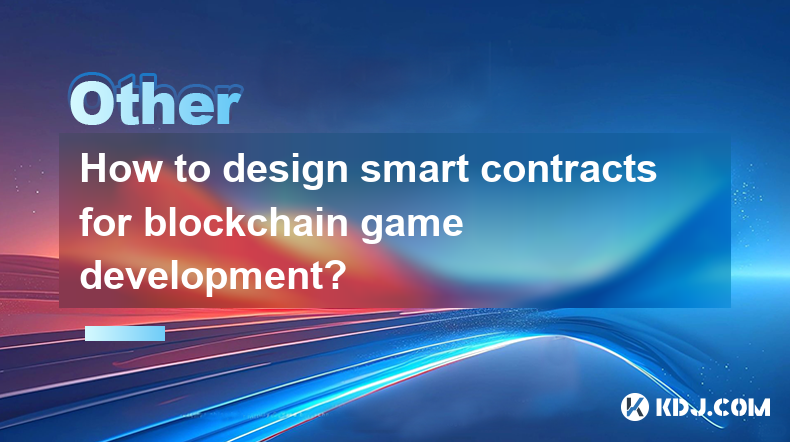
Designing smart contracts for blockchain game development is a crucial aspect of creating engaging, secure, and decentralized gaming experiences. Smart contracts automate game rules and transactions, ensuring fairness and transparency. This article will delve into the process of designing smart contracts for blockchain games, covering essential steps, best practices, and considerations.
Understanding Smart Contracts in Blockchain Games
Smart contracts are self-executing contracts with the terms of the agreement directly written into code. In the context of blockchain games, they manage game logic, asset ownership, and transactions. Smart contracts ensure that game rules are enforced automatically and transparently, reducing the need for intermediaries and enhancing trust among players.
When designing smart contracts for games, developers must consider the game's mechanics, player interactions, and the blockchain platform's capabilities. The choice of blockchain platform, such as Ethereum, Binance Smart Chain, or others, significantly impacts the design and functionality of smart contracts.
Planning the Game Mechanics
Before writing any code, it's essential to thoroughly plan the game mechanics. This involves outlining the rules, player actions, and how assets will be managed within the game. Identify the core functionalities that need to be automated by smart contracts, such as asset transfers, reward distribution, and game state updates.
Consider the following aspects when planning:
- Asset Management: How will in-game assets be created, owned, and transferred?
- Game Rules: What are the rules governing player actions, and how will they be enforced?
- Reward System: How will players earn and receive rewards?
- Interoperability: Will the game interact with other games or external systems?
Writing the Smart Contract Code
Once the game mechanics are clearly defined, you can start writing the smart contract code. Choose a suitable programming language based on the blockchain platform. For example, Solidity is commonly used for Ethereum-based smart contracts.
Here's a step-by-step guide to writing a smart contract for a blockchain game:
- Set up the Development Environment: Install the necessary tools such as Truffle, Remix, or Hardhat for Ethereum development.
- Define the Contract Structure: Outline the contract's functions, variables, and events. Use clear and descriptive naming conventions.
- Implement Asset Management: Write functions to create, transfer, and manage in-game assets. Ensure that ownership and permissions are correctly handled.
- Enforce Game Rules: Implement the game's logic using conditional statements and loops. Ensure that the rules are clear and enforceable.
- Handle Rewards and Transactions: Write functions to distribute rewards and handle transactions securely. Use appropriate data structures to track player progress and rewards.
- Test the Contract: Use unit tests and integration tests to verify that the contract behaves as expected. Test edge cases and potential vulnerabilities.
Ensuring Security and Auditing
Security is paramount when designing smart contracts for blockchain games. A single vulnerability can lead to significant financial losses and damage to the game's reputation. Therefore, thorough security audits are essential.
Consider the following security best practices:
- Code Audits: Engage professional auditors to review the smart contract code. They can identify potential vulnerabilities and suggest improvements.
- Use Established Libraries: Leverage well-tested libraries and frameworks to minimize the risk of introducing new bugs.
- Implement Access Control: Use role-based access control to restrict sensitive functions to authorized users only.
- Limit Gas Usage: Optimize the contract to minimize gas costs and prevent potential denial-of-service attacks.
Testing and Deployment
Before deploying the smart contract to the mainnet, it's crucial to test it thoroughly on a testnet. Test the contract under various scenarios to ensure it behaves as expected. This includes testing with different player inputs, edge cases, and high-load conditions.
Once testing is complete, deploy the smart contract to the mainnet. Follow the blockchain platform's deployment procedures carefully. For Ethereum, this involves compiling the contract, generating the ABI, and using tools like Truffle or Remix to deploy the contract.
After deployment, monitor the contract's performance and be prepared to make updates if necessary. Keep a close eye on user feedback and be ready to address any issues that arise.
Integrating with the Game Frontend
The final step in designing smart contracts for blockchain games is integrating them with the game's frontend. This involves connecting the game's user interface to the smart contract functions. Players should be able to interact with the game seamlessly, without needing to understand the underlying blockchain technology.
To integrate the smart contract with the frontend:
- Use Web3 Libraries: Implement libraries like Web3.js or Ethers.js to interact with the blockchain and smart contract.
- Create User-Friendly Interfaces: Design intuitive interfaces that allow players to perform actions like asset transfers and reward claims.
- Handle User Wallets: Implement wallet integration to allow players to connect their blockchain wallets to the game.
- Manage Transaction States: Clearly indicate the status of transactions, such as pending, confirmed, or failed, to keep players informed.
FAQs
Q: Can smart contracts be updated after deployment?
A: Yes, smart contracts can be updated using upgradeable patterns like proxy contracts. However, this requires careful planning and implementation to ensure security and compatibility.
Q: How can I ensure that my smart contract is gas-efficient?
A: To ensure gas efficiency, optimize your code by minimizing loops, using appropriate data structures, and avoiding unnecessary storage operations. Regularly review and refactor your code to improve efficiency.
Q: What are the common pitfalls to avoid when designing smart contracts for games?
A: Common pitfalls include overlooking edge cases, not handling reentrancy vulnerabilities, and failing to implement proper access control. Thorough testing and audits can help mitigate these risks.
Q: How can I protect my game's smart contracts from hacks and exploits?
A: To protect your game's smart contracts, conduct regular security audits, use established security patterns, implement proper access controls, and stay updated on the latest security best practices in the blockchain space.
Disclaimer:info@kdj.com
The information provided is not trading advice. kdj.com does not assume any responsibility for any investments made based on the information provided in this article. Cryptocurrencies are highly volatile and it is highly recommended that you invest with caution after thorough research!
If you believe that the content used on this website infringes your copyright, please contact us immediately (info@kdj.com) and we will delete it promptly.
- MS Dhoni-led Chennai Super Kings (CSK) returned to winning ways with a five-wicket victory over Lucknow Super Giants at the Ekana
- 2025-04-15 17:00:14
- Echo, a groundbreaking centralized cryptocurrency exchange, has announced that it will officially launch globally on May 15, 2025.
- 2025-04-15 17:00:14
- Pi Network's Chainlink Integration Sparks 35% Price Increase, Shocking the Markets
- 2025-04-15 17:00:12
- Meana Raptor Launches Its Private Presale for $MRT
- 2025-04-15 17:00:12
- Trump Tariff Revenues To Fund US Bitcoin Reserve
- 2025-04-15 16:55:18
- 79 companies now hold nearly 700,000 BTC, equivalent to an estimated treasure of 57 billion dollars.
- 2025-04-15 16:55:18
Related knowledge
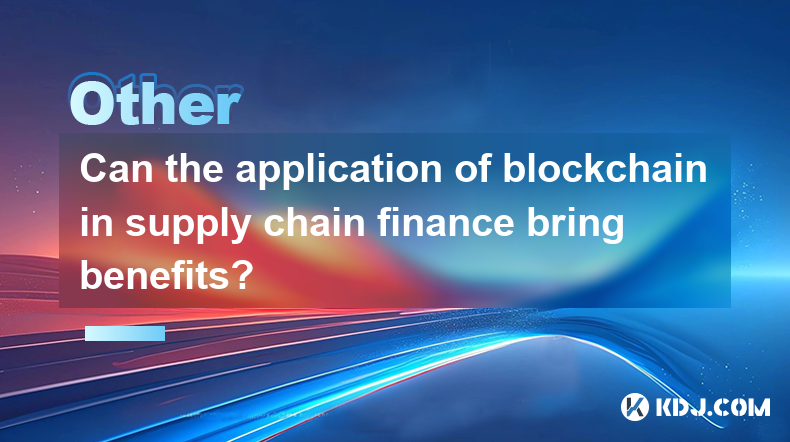
Can the application of blockchain in supply chain finance bring benefits?
Apr 15,2025 at 04:00pm
Can the application of blockchain in supply chain finance bring benefits? The integration of blockchain technology into supply chain finance has garnered significant attention in the cryptocurrency and financial sectors. This article explores how blockchain can potentially revolutionize supply chain finance, detailing its benefits and providing a compre...

Does the ranking of Chinese blockchain apps include cross-chain applications?
Apr 14,2025 at 04:00pm
The ranking of Chinese blockchain apps is a comprehensive evaluation that takes into account various aspects such as user base, transaction volume, and technological innovation. A pertinent question arises regarding whether these rankings include cross-chain applications. Cross-chain applications, which allow different blockchain networks to interact an...
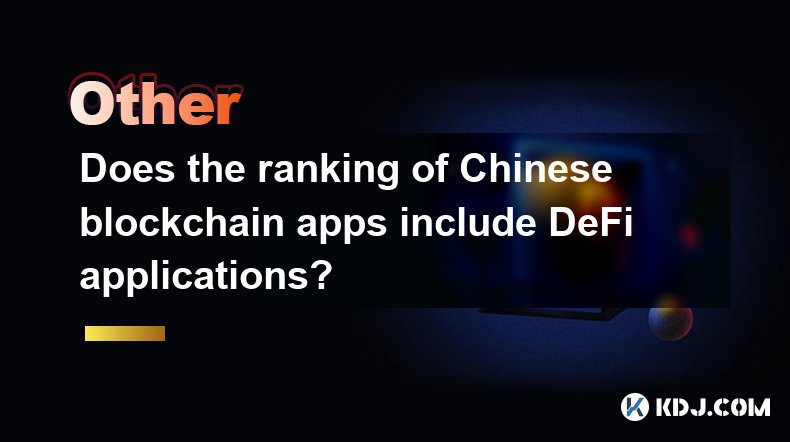
Does the ranking of Chinese blockchain apps include DeFi applications?
Apr 15,2025 at 06:57am
The ranking of Chinese blockchain apps is a comprehensive list that showcases the most popular and influential applications within the cryptocurrency ecosystem. One question that often arises is whether these rankings include DeFi applications. To answer this, we need to delve into the specifics of how these rankings are compiled and what types of appli...
Does the ranking of Chinese blockchain apps include enterprise-level applications?
Apr 15,2025 at 06:42am
The ranking of Chinese blockchain apps often includes a variety of applications, ranging from consumer-focused to enterprise-level solutions. Understanding the scope and criteria for these rankings is essential to determine if enterprise-level applications are included. This article delves into the specifics of how Chinese blockchain app rankings are co...
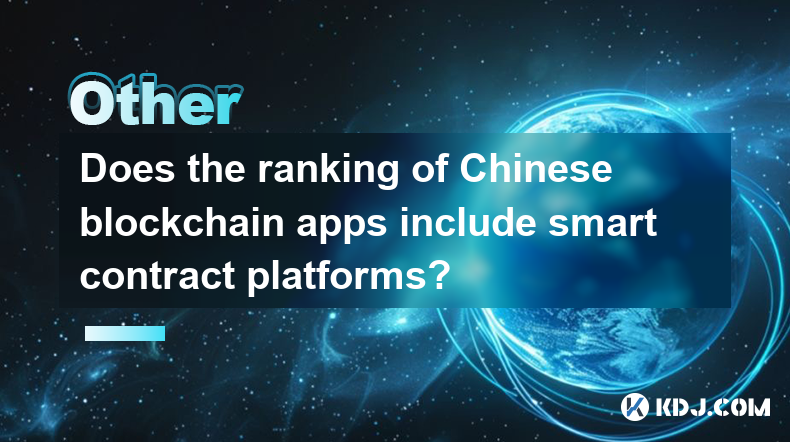
Does the ranking of Chinese blockchain apps include smart contract platforms?
Apr 15,2025 at 02:43pm
The ranking of Chinese blockchain apps often includes a wide variety of applications, and one of the most frequently asked questions is whether these rankings encompass smart contract platforms. To address this query comprehensively, it's essential to understand the composition of these rankings, the criteria used for evaluation, and the specific smart ...
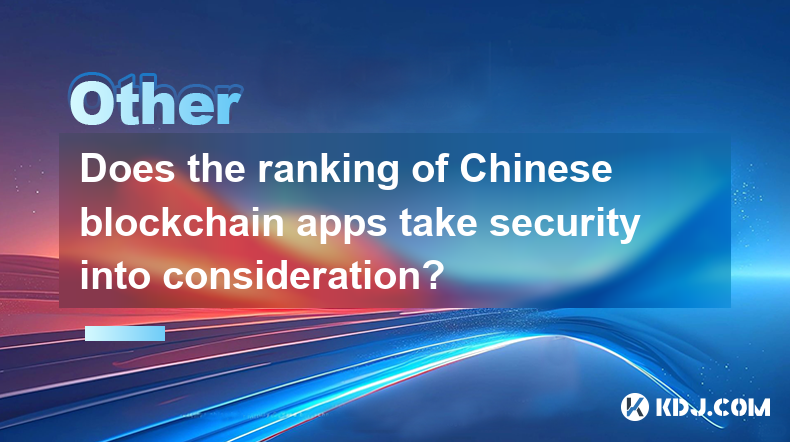
Does the ranking of Chinese blockchain apps take security into consideration?
Apr 14,2025 at 05:00pm
The ranking of Chinese blockchain apps indeed takes security into consideration, as it is a crucial factor in the overall evaluation of these applications. Security is not only about protecting users' data and assets but also about ensuring the integrity and reliability of the blockchain network itself. In this article, we will delve into how security i...

Can the application of blockchain in supply chain finance bring benefits?
Apr 15,2025 at 04:00pm
Can the application of blockchain in supply chain finance bring benefits? The integration of blockchain technology into supply chain finance has garnered significant attention in the cryptocurrency and financial sectors. This article explores how blockchain can potentially revolutionize supply chain finance, detailing its benefits and providing a compre...

Does the ranking of Chinese blockchain apps include cross-chain applications?
Apr 14,2025 at 04:00pm
The ranking of Chinese blockchain apps is a comprehensive evaluation that takes into account various aspects such as user base, transaction volume, and technological innovation. A pertinent question arises regarding whether these rankings include cross-chain applications. Cross-chain applications, which allow different blockchain networks to interact an...

Does the ranking of Chinese blockchain apps include DeFi applications?
Apr 15,2025 at 06:57am
The ranking of Chinese blockchain apps is a comprehensive list that showcases the most popular and influential applications within the cryptocurrency ecosystem. One question that often arises is whether these rankings include DeFi applications. To answer this, we need to delve into the specifics of how these rankings are compiled and what types of appli...

Does the ranking of Chinese blockchain apps include enterprise-level applications?
Apr 15,2025 at 06:42am
The ranking of Chinese blockchain apps often includes a variety of applications, ranging from consumer-focused to enterprise-level solutions. Understanding the scope and criteria for these rankings is essential to determine if enterprise-level applications are included. This article delves into the specifics of how Chinese blockchain app rankings are co...

Does the ranking of Chinese blockchain apps include smart contract platforms?
Apr 15,2025 at 02:43pm
The ranking of Chinese blockchain apps often includes a wide variety of applications, and one of the most frequently asked questions is whether these rankings encompass smart contract platforms. To address this query comprehensively, it's essential to understand the composition of these rankings, the criteria used for evaluation, and the specific smart ...

Does the ranking of Chinese blockchain apps take security into consideration?
Apr 14,2025 at 05:00pm
The ranking of Chinese blockchain apps indeed takes security into consideration, as it is a crucial factor in the overall evaluation of these applications. Security is not only about protecting users' data and assets but also about ensuring the integrity and reliability of the blockchain network itself. In this article, we will delve into how security i...
See all articles























































































